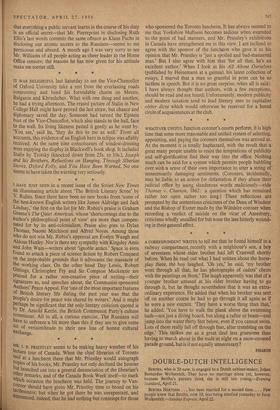I HAVE JUST SEEN in a recent issu: of the
Soviet New Times an illuminating article about 'The British Literary Scene' by V. Rubin. Since there have been no new books from 'some of the best-known English writers like James Aldridge and Jack Lindsay,' the first on the list for Mr. Rubin's praise is Graham Greene's The Quiet American, whose 'shortcomings due to the author's philosophical point of view' are more than compen- sated for by its anti-colonialism. Praise also goes to Dylan Thomas, Naomi Mitchison and Alfred Noyes. Among those who do not win Mr. Rubin's approval are Evelyn Waugh and Aldous Huxley. Nor is there any sympathy with Kingsley Amis and John Wain—writers about 'ignoble antics.' Space is even found to attack a piece of science fiction by Robert Conquest on the improbable grounds that it advocates the massacre of the working class. On the other hand Day Lewis, Robert Gratings, Christopher Fry and Sir Compton Mackenzie are Praised for a rather non-creative piece of writing—their signatures to, and speeches about, the Communist-sponsored Authors' Peace Appeal. For 'one of the most important features of British literary life during the past year was that the People's desire for peace was shared by writers.' And it might perhaps be significant that the only literary criticism quoted is by Or, Arnold Kettle, the British Communist Party's culture commissar. All in all, a curious exercise. The Russians will have to unfreeze oa bit more than this if they are to give some air of verisimilitude to their new line of honest cultural exchange. * * *










































 Previous page
Previous page